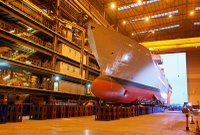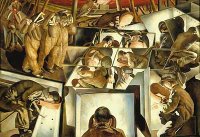The 'black trades' in the shipyards of Tyne and Clyde


Down in the bowels of the ships being erected at Swan Hunters and at Hawthorn Leslie and many other shipyards on the banks of the River Tyne and at John Brown's on the bustling banks of the River Clyde, men worked in dirt and filth, in constant danger; the welders and the platers, boilermen and the riveters, cutting, bending, and fastening together the great sides of the hull - the innards of metal that floats on water.
Many died in the dust and the dirt - pipe fitters lagged their work with asbestos 'monkey dung' oblivious of the dangers to their health. Welders breathed in the smoke and the particles of flux that were spit from the arc a few inches in front of their faces.
All who worked below were constantly in danger of being crushed or cut in half as slings and ropes broke, and thick plate came crashing down on those hard at work at their trade.
When the job was done - when the liner went down the slipways into the rivers, these men were the first to be laid off until the order books filled up and work began again on another giant.
Through it all, the spirit of the working classes came out. One man, imitating the sounds of different animals - cats and dogs - deep in the hulls of ships, to make his workmates laugh, the better to get through their hard day, was ironically ignored as he cried for help after breaking his leg - his mates thought he was still joking.
The 'Big Yin', Billy Connelly, and those two crackpots from Oldham, Tommy Cannon and Bobby Ball, all got out of welding, by virtue of still having a sense of humour, even on those freezing winter days in Glasgow when men put their hands around an electric light bulb to put some life into them.
'Cold steel in cold water, no sunlight or anything to warm us'; we owe them a lot. Yet how eagerly does capital desert what looks like a sinking ship. In those days, virtually all the ships on this side of the Atlantic were built downriver from Newcastle and Glasgow. How many are built there now?
When Swan's were taking on men, the streets were thronged with men and women running to the gates to get work.
When the buzzers sounded, it was like a whole town coming out to go home to rest until the morning.
Robert Leslie Fielding

0 Comments:
Post a Comment
Visit My Website<< Home